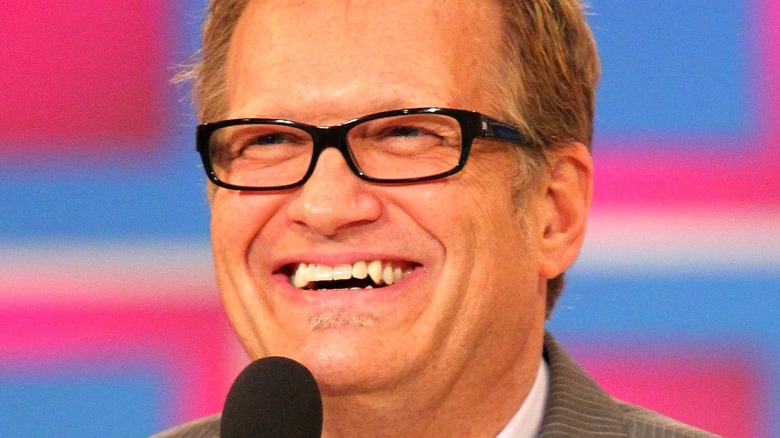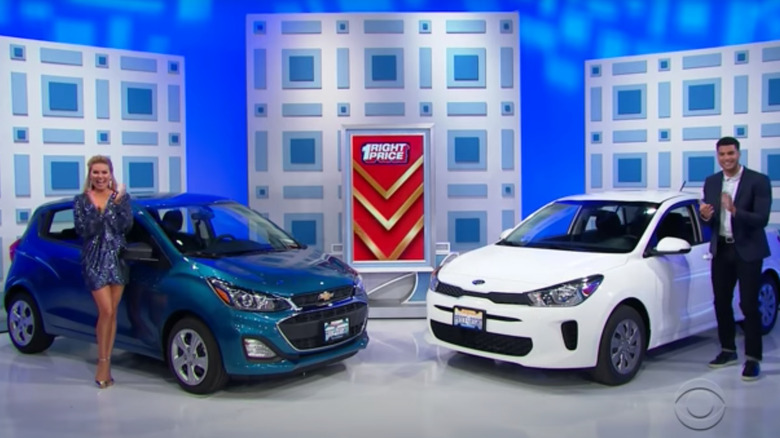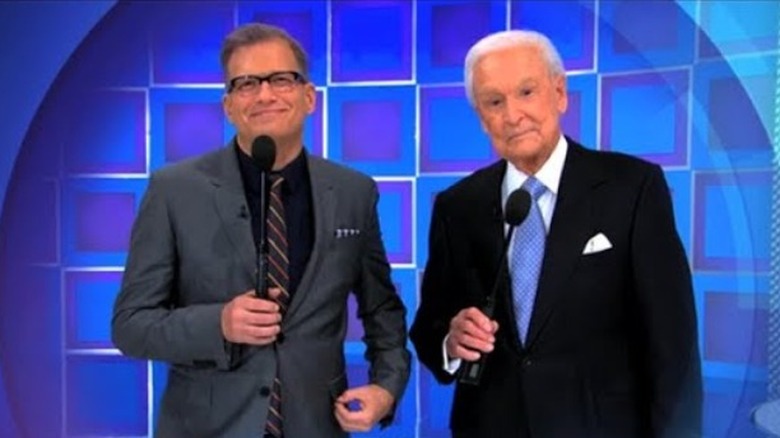What It Actually Means To Win A Car On The Price Is Right
The daytime game show "The Price Is Right" dates all the way back to '50s. Back then the program was in black and white, didn't feature iconic host Bob Barker, and was a part of NBC, not CBS (via the Bill Cullen Archive). Barker took on the role of host for the 1972 revival, replacing original host Bill Cullen. When Barker retired in 2007, comedian Drew Carey stepped up to the plate and has been host ever since. While we've seen different hosts, the core idea remains the same.
In 1990, Barker told the LA Times his thoughts on the "Price Is Right"'s long-lived popularity. He credited "the powerful basic premise of the show – everything is based on prices. Everyone identifies with prices. The minute we put something up for bid and the contestant makes a bid, the viewer is involved." After the prices come the prizes: new cars, pool tables, washers and dryers, hot tubs, cash – you name it; "The Price Is Right" gifts it.
The idea of driving off the soundstage in a brand new cherry convertible, an all-expense-paid trip to Hawaii, and a cash prize sounds like the new American dream. But like anything that sounds too good to be true, winning a car or any other big prizes on the game show has a set of strings attached. There's a lot you should know about what happens behind the scenes when you win big on "The Price Is Right."
The Golden State takes its share
Some gameshow winners are quick to tell you about the reality of their prizes. "The Price is Right" car winner Debra Field went into detail about the process when she spoke to the Asbury Park Press. She explained that after the taping, contestants are given a list of their prizes and must consent to pay California income taxes. Winners who live outside the state like Deborah can pick up their car at a local dealership, but only after they've sent in a certified check to pay off the sum tax of all the prizes they've chosen to keep. For some winners, that may mean going home empty-handed.
During a 2018 AMA, a showcase winner went into detail about their showcase, as well as other winners on the same episode. They explained that someone who won a $15,000 trip to South Africa didn't have the cash to pay the taxes up front and ended up declining the trip.
Of course, if you win something more tangible, like a car, it might be worth it to scrounge around for a couple of thousand dollars. Car winner Andrea Schwartz told A.V. Club that she viewed the taxes as a sort of investment. After paying the California tax, the car was hers to do what she pleased with. Schwartz sold the car, making back what she paid in taxes and then some.
Winning a showcase might not be all it's cracked up to be
In their AMA, Redditor ProjectOcoee shared that they walked away with $39,889 in showcase cash and prizes when "all was said and done." The former contestant said they "sold the car, kept the lawn equipment, took the trip. The rest was cash. After all was said and done after taxes I walked away with lawn equipment, a trip and about $15000 cash..." Not too shabby, but right on the heels of the state tax comes the federal tax. The OP explained that winners receive a 1099G at the end of the year, which means the value of all the prizes must be reported as additional income on your year-end income taxes and to everyone else that gets a share.
An unnamed "Price Is Right" winner told ABC that "one guy won a $10,000 cash prize and didn't take it because he didn't want to pay half to his ex-wife." Walking away with a big prize can also mean being taxed at a higher rate than you would normally pay. CPA Melissa Labant explained to SmartMoney that a very pricy prize can bump winners into a higher tax bracket.
What about trading in the prizes for cash? According to the AMA, the show decides which prizes are eligible for trade, which in this case included smaller items like iPods. Despite some inconvenient math, there's a reason the show has been running for over 50 years. There is no feeling like being right and being rewarded handsomely for it. Like one Redditor said, "who would turn down $15,000 minus taxes? No one." Well, except that divorced guy.


